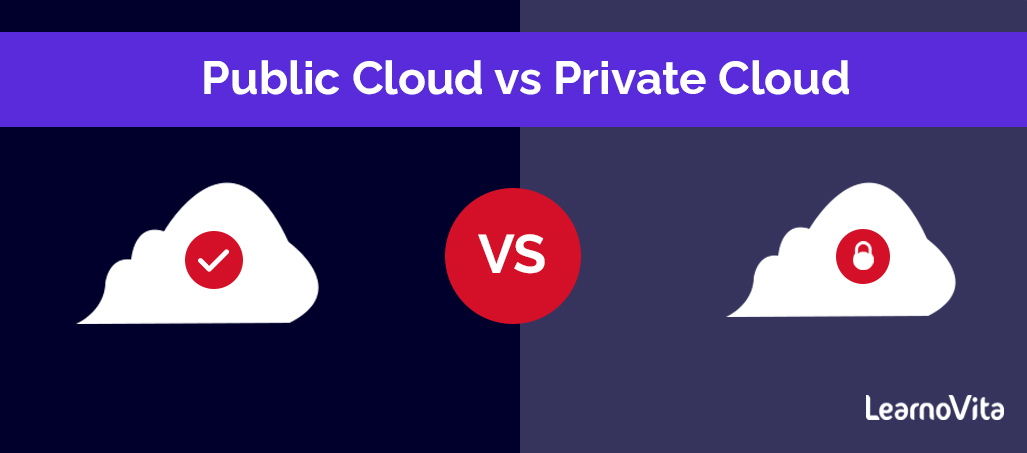
Public Cloud vs Private Cloud | Know Their Differences and Which Should You Learn?
Last updated on 04th Nov 2022, Artciles, Blog
- In this article you will learn:
- 1.What is a Public Cloud?
- 2.What is Private Cloud?
- 3.Public Cloud Vs. Private Cloud.
- 4.Conclusion.
What is a Public Cloud?
A public cloud is the cloud computing deployment model in which resources like servers and storage, are owned and operated by a third parties and delivered by an internet.The model enables organizations of all sizes to implement different solutions and computing resources to meet growing needs.
What is Private Cloud?
It comprises the cloud computing resources used exclusively by one company or an organization. Private cloud can be deployed at a company’s on-site data center. However, this miscalculation may lead to hazards.
Public Cloud Vs. Private Cloud:
Here are important differences between the Public and Private Clouds Although both the public and private cloud provide hosting solutions the way they can operate differs when it comes to security, performance, and control.

| Parameters | Public Cloud | Private Cloud |
|---|---|---|
| Definition | A public cloud is the computing environment in which computing infrastructure and resources are shared with a public over an Internet. | A private cloud is the computing infrastructure and resource-sharing network that is connected by the Internet to private network. |
| Work on | Public cloud functions on a principle of a storage demand scalability. | Private cloud can only be a shared among users of organization. |
| Control over Infrastructure | Public cloud deployment control over an infrastructure is a limited. | A Private cloud environment provides a complete control. |
| Connection | It is connected to a public Internet. | It only offers a connectivity over a private network. |
| Hosted | It is hosted at a Service Provider site. | It is hosted at a Service Provider site or an enterprise. |
| Business requirement | It is an affordable solution that provides a room for growth. | High performance, security, customization, and a control options. |
| Best use | It is widely used to offers a web-based email, online storage, application testing, and development environments. | Uses widely in application to protect a most sensitive data and applications. |
| Scalability | It is managed by a Cloud Service Provider’s technical team. | It is managed by a In-house technical administrators. |
| Managed by | A public cloud is the multi-tenant in which service provider manages a network. | A private cloud is a like a single tenant in which in-house team handles network. |
| Cost | It is affordable option offering pay-as-you-go service fee. | It needs a large upfront costs for implementing a hardware, software, staff, and other resources. |
| Billing method | Users have to pay monthly bill for a public cloud services. | In a Public cloud, money is charged based on usage GB and a bandwidth transfer fees. |
| Reliability | Reliability is a moderate here. | Private infrastructure provide a high level of reliability. |
| Demand for in-house software | Not needed in cloud computing model. | A Very high in-house software requirement. |
| Security | Only provide an essential security compliance. | Enhanced security to meet a data protection legislation. |
| Performance | In a public cloud, performance is low to medium. | The performance is more in a private cloud. |
| Servers | It covers a shared servers. | It covers a devoted servers. |
| Example | A public cloud is a comparable to renting a truck from the large company that is available to be everyone. | The concept of private cloud can be compared to be owning and managing a fleet of a trucks. |
| Providers | An Amazon web service (AWS) and Google AppEngine etc. | A Microsoft KVM, HP, Red Hat & VMWare etc. |

Advantages Public Cloud:
- Don’t need to keep a cloud.
- Does not have any limit on a number of users.
Advantages Private Cloud:
- Get complete command over service integration, IT operations, policies, and a user behavior.
- Companies can customize solution according to the market demands.
- It offers an exceptional reliability in performance.
- A private cloud enables a company to tailor solution to meet a specific needs.
Disadvantages Public Cloud:
- Provides a Minimal Control.
- Privacy and an organizational autonomy are not possible.
Disadvantages Private Cloud:
- The private cloud is be quite expensive, with relatively high operating cost.
- Scalability depends on a choice of hardware.
- Minimal mobile Access.
Conclusion:
The final selection between the public or private cloud solutions depends on different factors, use cases, and limitations.Generally organizations that need a high level of performance, security, and control should opt for private cloud deployment model, whereas those who are a perhaps smaller companies with the limited budget should consider public cloud.
Are you looking training with Right Jobs?
Contact Us- Hadoop Tutorial
- Hadoop Interview Questions and Answers
- How to Become a Hadoop Developer?
- Hadoop Architecture Tutorial
- What Are the Skills Needed to Learn Hadoop?
Related Articles
Popular Courses
- Hadoop Developer Training
11025 Learners - Apache Spark With Scala Training
12022 Learners - Apache Storm Training
11141 Learners
- What is Dimension Reduction? | Know the techniques
- Difference between Data Lake vs Data Warehouse: A Complete Guide For Beginners with Best Practices
- What is Dimension Reduction? | Know the techniques
- What does the Yield keyword do and How to use Yield in python ? [ OverView ]
- Agile Sprint Planning | Everything You Need to Know
